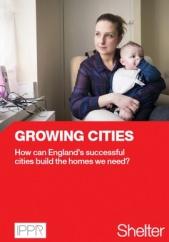Growing Cities, How can England’s successful cities build the homes we need?
Growing Cities, How can England’s successful cities build the homes we need?was published by by the Institute for Public Policy Research (IPPR) and Shelter in July 2015. It was written by Matt Griffith and Pete Jefferys and addresses ways in which England’s growing cities can build enough new homes to accommodate their success.
During 2014, IPPR and Shelter assessed four cities:
- York.
- Cambridge.
- Oxford.
- Bristol.
The report proposes that these are economically-successful mid-sized English cities that are being held back by chronic housing pressures, suggesting that if economically-buoyant areas cannot deliver new homes, there is little hope for the rest of the country.
It suggests that the key barriers to home building are; not enough land, and the wrong development incentives.
The report states, ‘Cities offer the clearest and strongest long term prospects of building more homes. In addition to political will, growing cities also have the underlying economic base to support a new approach to housing growth. They need better tools in their armoury to get more and better homes built on both brownfield and greenfield sites while commanding local popular support.'
The report cites; Lord Heseltine’s growth review, Labour’s Lyons Housing Review, the City Growth Commission, work by the Centre for Cities, and by URBED, the winners of the Wolfson Economics Prize 2014, and suggests that it is necessary to devolve powers and budgets to cities, recommending that:
- Councils within city-regions should be strongly incentivised to work closely together to co-ordinate building more homes.
- Strategic planning powers and budgets should be devolved to cities and resources such as public land should be pooled and coordinated across boundaries.
- Councils which block growth or refuse to co-operate should face financial penalties.
- Growing cities should be able to tax land that has planning permission but is being held back from being built, or built only very slowly.
- Where land with planning permission remains unbuilt, cities should have the backstop power to buy it with a compulsory purchase order, to incentivise market-led growth.
- Cities should be able to set up New Homes Zones on strategic sites which reduce land costs and therefore provide high quality, genuinely affordable homes.
- Cities should innovate with alternative models for development such as custom-build, based on national and international best practice.
- Cities should conduct green belt reviews to identify beautiful and publically-valuable land to protect, with active and democratic input from local people.
- Reviews should also identify low public value land, which is close to transport links and suitable for growth.
- Cities should be able to develop high-quality, green communities on low-value land, with ownership held in perpetuity by a Green Belt Community Trust.
Featured articles and news
A case study and a warning to would-be developers
Creating four dwellings... after half a century of doing this job, why, oh why, is it so difficult?
Reform of the fire engineering profession
Fire Engineers Advisory Panel: Authoritative Statement, reactions and next steps.
Restoration and renewal of the Palace of Westminster
A complex project of cultural significance from full decant to EMI, opportunities and a potential a way forward.
Apprenticeships and the responsibility we share
Perspectives from the CIOB President as National Apprentice Week comes to a close.
The first line of defence against rain, wind and snow.
Building Safety recap January, 2026
What we missed at the end of last year, and at the start of this...
National Apprenticeship Week 2026, 9-15 Feb
Shining a light on the positive impacts for businesses, their apprentices and the wider economy alike.
Applications and benefits of acoustic flooring
From commercial to retail.
From solid to sprung and ribbed to raised.
Strengthening industry collaboration in Hong Kong
Hong Kong Institute of Construction and The Chartered Institute of Building sign Memorandum of Understanding.
A detailed description from the experts at Cornish Lime.
IHBC planning for growth with corporate plan development
Grow with the Institute by volunteering and CP25 consultation.
Connecting ambition and action for designers and specifiers.
Electrical skills gap deepens as apprenticeship starts fall despite surging demand says ECA.
Built environment bodies deepen joint action on EDI
B.E.Inclusive initiative agree next phase of joint equity, diversity and inclusion (EDI) action plan.
Recognising culture as key to sustainable economic growth
Creative UK Provocation paper: Culture as Growth Infrastructure.






















